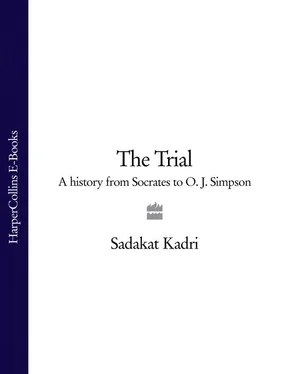Although the modern mind tends to picture Greek courtrooms as sunbleached temples to debate and deliberation, a similar tension between reason and unreason characterized the rituals that were used to resolve actual crimes in fifth-century Athens. Freemen had gained the right to judge – which they would exercise not in groups of ten, but in assemblies of up to a thousand and one – but while they were building a fizzing, babbling democracy, seventy silent per cent of the adult population remained legal nonentities. Women were permitted to litigate only through guardians, while slaves could not even give evidence except under torture, on the strength of a theory that they were constitutionally incapable of telling the truth unless subjected to great pain.
Trials for homicide, a touchstone of the social order in any close-knit community, were not just affected by superstition but founded on it. It was commonly believed that killers exuded the miasma , a vapour so abhorrent to the gods that the slightest whiff could incite them to rage, so despicable that those around whom it clung were barred from temples, games, and marketplace – and so persistent that only a trial could dispel it. The origins of the miasma are as misty as those of any myth but its existence in fifth-century Athens was a firmly established sociological fact. Murder trials were held outdoors to minimize the risk of infection, and at least one defendant relied on its reality to prove his innocence, pointing out to his judges that he had recently sailed in a ship that had not sunk. Killers sometimes attended court to purge themselves even when there was no one to prosecute them – as might happen if the deceased was a legal cipher like a slave – and one Athenian tribunal, the prytaneion , was dedicated to nothing but the prosecution of killer beasts and murderous objects. * Defendants who had been exiled for one murder but wanted to cleanse themselves of a second charge were tried in the most prudent court of all. It convened at a stretch of Athenian shoreline called the Phreatto where the accused addressed his judges from a boat, which bobbed offshore at a suitably circumspect distance.
The superstition played an important role in anchoring the criminal trial in Athenian society. It sharpened the only choice open to most defendants in the ancient world – whether to undergo a trial or enter exile – and at a time when predators human and bestial roamed the countryside, those accused had every reason to take their chances in court. It simultaneously made it more likely that accusers would prosecute, for the miasma was also thought to linger around anyone who failed to obtain vengeance. And as it became established that prosecutions were as valid a form of revenge as any other, the premium that was placed throughout the ancient world on life behind a city’s walls also generated its own moral basis for the exercise of judicial power. The law codes of Israel and Judah instructed municipal officials to grant sanctuary to killers only if they agreed to stand trial, and in Athens, where idealization of the city ran especially deep, it became established that judgments were binding, whether right or wrong. A willingness to take complaints to court and abide by judicial rulings became, literally, the civilized thing to do.
No ancient trial better illuminates the development than the most famous one of them all: the prosecution of Socrates, charged in 399 BC with having invented new spiritual beings and corrupted Athenian youth. The 70-year-old was a metropolitan fixture at the time of his prosecution: an ugly, acerbic and provocative philosopher who had spent decades haranguing hecklers and debating passers-by on the nature of the universe. Through a series of historical accidents, the accusations have entered popular history as the persecution of a sage, condemned by a city that could not bear to hear some harsh truths about itself. The assessment obscures considerably more than it illuminates.
It stems from the eyewitness reports of just two men – Socrates’ pupil, Plato, and an acquaintance called Xenophon – and neither is a reliable narrator. Plato produced the more comprehensive account, but the future philosophical colossus, then a mere prodigy of 28, omitted to record much of the crucially important political background to the case. Assumptions of style and relevance undoubtedly played some part in that, but so too did the fact that Plato idolized his teacher and was concerned throughout to portray him in the purest light. One effect has been to consolidate an enduring popular myth that the charges were more irrational than they were. Another has been to blur one of the most important aspects of the trial. Plato’s account leaves no doubt that the prosecution pitted the community against the individual, but its outcome illustrated how Socrates was bound to Athens as much as it showed his ability to stand up against it.
The Athens that put Socrates on trial was a shadow of the city that Aeschylus had glorified half a century before. Three decades of war with Sparta, its militaristic rival, had recently come to an end. The Spartans had vanquished the Athenian navy and then reduced the city’s starving population to unconditional surrender before destroying its fleet and demolishing its walls. The physical collapse was rapidly followed by political disintegration. A despotically inclined citizen called Critias had established a collaborationist oligarchy known as the Thirty, and for eight months Athens became a police state, terrorized by bands of dagger- and whip-wielding thugs who daily murdered opponents of the new dispensation. Around fifteen hundred people were summarily executed – almost as many as had died over the previous ten years of war – before the terror came to an end in 403 BC. The restored democracy declared an amnesty for political offences in the interests of peace – but plenty of Athenians remained eager to settle accounts.
Socrates was among those who paid, heavily, but he was not chosen at random. No one has ever been entirely sure what ideas he expounded, because he wrote nothing and owes his philosophical footprint to Plato; but among the tenets later attributed to him were a number that chimed neatly with those of the oligarchs. They included a belief that wise individuals could gain insights into absolute truths – a claim that was well suited to those who subscribed to the ‘rule of the best’, or aristokratia , and who pointed out that democracy could guarantee neither wisdom nor justice. It is also known that Socrates was not only an indirect inspiration to the enemies of democracy. He had taught several men closely associated with the Thirty – one of whom was none other than Plato, connected to the aristocrats by a web of social and family connections. Another was a second cousin to Plato – Critias himself. As if that did not make the old man suspect enough, he was widely known to admire Sparta, a fact so notorious that the playwright Aristophanes had mocked him for it throughout his comedy, The Clouds.
None of the smears had much substance. Whatever Critias may have taken away from his lessons with Socrates, the older man remained sufficiently independent to disobey an order to arrest an innocent man during Critias’ time in power. The single-mindedness of Spartan society certainly appealed to the philosopher in Socrates, very likely because he saw in its rigour a triumph of the human will. The totalitarian shadow of such beliefs is now apparent, but it could not have been to Socrates, and his admiration for Sparta seems to have resembled the rose-tinted feelings that some twentieth-century intellectuals once harboured towards the Soviet Union – symptomatic of idealistic impatience rather than venomous treachery. His ideological flirtations did not, in any event, stop him serving Athens loyally during the war, both as a civic officer and as a soldier.
Читать дальше




![Theresa Cheung - The Dream Dictionary from A to Z [Revised edition] - The Ultimate A–Z to Interpret the Secrets of Your Dreams](/books/692092/theresa-cheung-the-dream-dictionary-from-a-to-z-r-thumb.webp)







